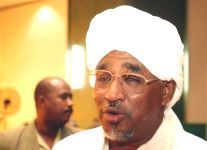Darfur peace talks delayed as AU prepares troops
By Silvia Aloisi
ABUJA, Oct 21 (Reuters) – The African Union (AU) recommended a four-day postponement of peace talks over Sudan’s Darfur region on Thursday after a transport mix-up left delegates stranded across the continent.

|
|
Majdoub el Khalifa Sudanese agriculture minister and head of Sudanese delegation to the peace talks speaks to journalist in Abuja Nigeria, Thursday Oct. 21, 2004. Delegates of the Government of Sudan and the two main rebel group resumed peace talks Thursday in Nigeria on ending the Darfur region crisis (AP). |
The AU-sponsored talks between the rebels and the government come against a backdrop of the imminent deployment of thousands more troops to monitor renewed fighting in Darfur, where 1.5 million people have been driven from their homes.
U.N. officials said they feared an end to the rainy season could lead to fresh fighting and urged governments to do more to help speed African Union troops to the troubled area.
Rebels and AU officials traded blame over who was responsible for failing to airlift rebel negotiators from Kenya, Sudan, Ethiopia and Chad to the talks in the Nigerian capital, which analysts say have little chance of success.
A previous round collapsed last month without an agreement on the conflict, which the United Nations says has caused one of the world’s worst humanitarian crises.
After a 30-minute opening ceremony, which went ahead despite the absence of several senior rebel negotiators, the AU special envoy for Darfur, Hamid al-Gabid, suggested formal talks should begin on Monday.
Government negotiators said they still wanted them to begin on Saturday. Delegates are expected to hold preliminary consultations on the agenda and timetable on Friday.
AFRICAN FORCE
The AU’s Peace and Security Council agreed on Wednesday to expand its force in Darfur, deploying more than 3,000 troops to bolster 150 ceasefire monitors and 300 AU troops already there.
The force’s main job will be to monitor a ceasefire agreed in April which both sides accuse each other of violating.
Najeib Abdelwahab, Sudan’s state minister for foreign affairs, said Khartoum wanted the rebels to recognise the ground situation had substantially improved.
“The government has made serious efforts in the security and humanitarian fields. But as they say, it takes two to tango,” he told Reuters.
A U.N. official said while there had been progress in getting food, water and sanitation to Darfur’s 2 million people in need, the security situation was deteriorating for aid workers and local inhabitants.
“I told the Security Council that security is long overdue … and that every effort now has to be made to bring in the African Union observers and troops,” said U.N. Emergency Relief Coordinator Jan Egeland.
“Every effort has to be made to ensure that the rebels and others do not use the end of the rainy season to step up fighting.”
A U.N. official in Khartoum said on Wednesday there were reports of a heavy bombardment in north Darfur.
ARMS
After years of skirmishes between Arab nomads and non-Arab farmers over scarce resources in arid Darfur, rebels took up arms early last year.
Rebels accuse the government of using Arab militias, known as Janjaweed, to loot and burn non-Arab villages. The Sudanese government admits arming some militias to fight the rebels, but denies any links to the Janjaweed, calling them outlaws.
The United Nations estimates 70,000 people have died from malnutrition and disease in the last seven months alone, a figure the Sudanese government disputes.
There are no reliable estimates of how many have been killed in the violence, which the United States has called genocide.
Analysts said both sides had an interest in dragging out the talks and that they were unlikely to reach a deal to resolve the crisis in Darfur, a region the size of France.
Ahmed Mohamed Tugod, the chief negotiator for the JEM rebel movement, said the success of the talks depended on “whether the government genuinely wants to resolve the real problems or not”.
“I don’t think there is any pressure on us, our position is very clear. We are not going to sign the humanitarian protocol unless we sort out the security issues,” he told Reuters.
